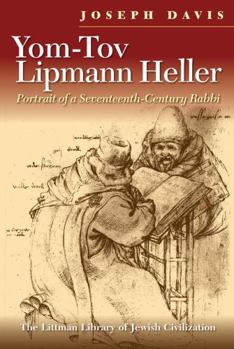Yom-Tov Lipmann Heller: Portrait of a Seventeenth-Century Rabbi
Select Format
Select Condition 
Book Overview
This study portrays a man and an age. Yom-Tov Lipmann Heller (1578-1654), author of the famous Mishnah commentary Tosafot yom tov, was a major talmudist, a disciple of the legendary Rabbi Judah Loew of Prague, and himself the distinguished chief rabbi of Prague and Cracow. The time in which he lived began as a 'golden age' for the Jews of Prague and the Jews of Poland, an age of prosperity and the rise of Jewish mysticism. During Heller's lifetime, however, the golden age changed to darkness, and prosperity gave way to war, persecution, plague, and massacres. It was the end of the Middle Ages, the last generation before Spinoza and Shabbetai Zevi. Scholar, preacher, religious and communal leader, Heller embodied a religious and cultural ideal; he was the very model of a seventeenth-century rabbi. Born in Germany, he moved from one end of the world of Ashkenazi Jewry to the other, first to Prague, and then to Poland and the Ukraine. His life was enmeshed in a web of family ties, and bounded by complex rules of class and religion. His writing reflects not only the full heritage of medieval Jewish thought and its crystallization in the seventeenth century, but also the time and place in which he lived. In many ways, he exemplified his age, its achievements, and its limitations. Carefully researched and well written, Joseph Davis's work is the definitive biography of Heller. He presents a richly detailed study of Heller's worldview, his conception of Judaism, of the world around him, and of himself within it: the seventeenth century seen through seventeenth-century eyes. Heller was eyewitness to momentous, epoch-making events: the beginning of the Thirty Years' War and the massacres of 1648. He lived through a time of tumultuous change. Texts such as the sermon in which Heller responded to the new astronomy of Brahe and Kepler, or a poem on the massacres of 1648 in which he enlarged the capacity of Hebrew poetry to express horror are significant in the larger context of Jewish and European history. Heller's world-view was not static or motionless. His world changed greatly during his lifetime, and his views of it likewise changed greatly over the fifty years from his first writings to his last, from youth to middle age to old age. His personal circumstances also contributed to this: the experience of betrayal, arrest, imprisonment, the death of his children, and other misfortunes led him to wrestle with such questions as the differences between Jews and non-Jews and the meaning of suffering. Davis weaves these developments succinctly into a fascinating narrative that does full justice both to Heller and the momentous events he experienced.
Format:Paperback
Language:English
ISBN:190411332X
ISBN13:9781904113324
Release Date:September 2005
Publisher:Littman Library of Jewish Civilization
Length:320 Pages
Weight:1.10 lbs.
Dimensions:0.7" x 6.1" x 9.2"
Customer Reviews
0 rating





